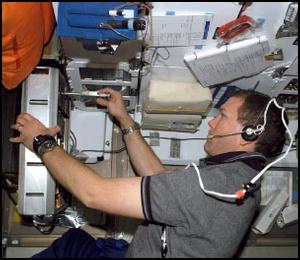Reports from 27/1/2003
 The astronauts on the space shuttle Columbia finally succeeded in photographing dust in the Mediterranean Sea and the Middle East as part of the Tel Aviv University experiment. According to them, these are actual amounts of dust that could have been photographed and the photographs transferred to Earth. Today the astronauts on the shuttle will talk to their colleagues on the International Space Station.
The astronauts on the space shuttle Columbia finally succeeded in photographing dust in the Mediterranean Sea and the Middle East as part of the Tel Aviv University experiment. According to them, these are actual amounts of dust that could have been photographed and the photographs transferred to Earth. Today the astronauts on the shuttle will talk to their colleagues on the International Space Station.
Dr. Yoav Yair reports to the Metz website from the control center of the Israeli experiment at the Goddard Space Center near Washington: "Here it comes! Ilan Ramon was able to photograph plumes of dust on the west coast of Africa using the cameras of the Israeli dust experiment. According to the forecast 24 hours before, the dust storm was indeed supposed to occur - and not only did the predictions come true - they were also photographed. The research women in the control room were very excited and will soon examine the photographs."
Dr. Yair also writes: "We are already on the tenth day of the mission and it seems that the routine has gained traction both at the top, with the astronauts, and also among the control teams in Houston and Maryland. Things are carried out carefully and with great professionalism, there is no great excitement and everything seems "day-to-day". Of course it's only so-called, because when you suddenly realize that the "Enter" command to your computer travels a distance of several tens of thousands of kilometers in space, via relay satellites, and that you have to wait more than a minute until the green light confirming that the shuttle received the command lights up - then you realize that we are dealing with a space mission , and not in something ordinary."
"The views and photographs broadcast from the shuttle's cameras are spectacular in their beauty and change rapidly as the shuttle passes over them at a speed of 8 kilometers per second. We in the control room try to focus on the task and decode as much information as possible from what the test cameras picked up. So far we have been able to detect lightning sprites of various types, and some dust... Most of the Middle East is covered in clouds."
Yedan Ilan Ramon
